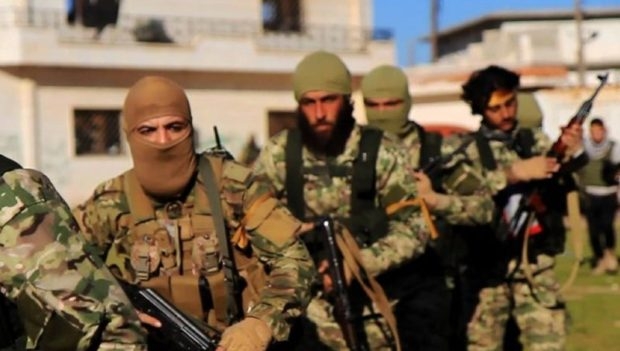Abu Mohammed al-Golani, incumbent emir of Jabhat Fateh al-Sham and a chief opposition leader against Bashar al-Assad's regime in Syria, had given the world of political and terror researchers a new controversial dispatch on July 28 that brought about wide discussions.
Golani’s speech was not limited to religion or politics, it was directed to a revelation on his group taking on exceptional tasks of holding its own entity against local and international powers, defending its strategic interests.
Jabhat Fateh al-Sham, formerly defined as the Syrian branch of al-Qaeda (al-Nusra Front), until its leader Golani announced on July 28 that it was breaking allegiance with the ultra-hardline terror organization. Golani’s movement is also fought and targeted by Al-Qaeda’s terror rival, ISIS.
After announcing the rebrand, observers admit that Golani had led his own group of militants through great transformation, embodying a new wave of awareness among radicals.
Somewhere between the conflict and cause, Golani and his movement realized the intertwining set of ideologies that did not go with Al-Qaeda’s mindset.
Unlike ISIS or Al-Qaeda, Jabhat Fateh al-Sham has developed a sense of nationalism to Syrian grounds.
The Syrian Experience
Al-Nusra Front (renamed Jabhat Fateh al-Sham) did not restrict its Fiqh derivations – theories or philosophies of Islamic law – to a specific source or cleric. Mustafa Setmariam Nasar (Abu Musab al-Suri), was not the only guideline reference used by the movement’s leaders, despite him being declared top al-Nusra Front Sharia official.
In early 2014, al-Nusra Front acknowledged that the group is largely influenced by the teachings of Abu Musab al-Suri. The strategies derived from Abu Musab’s guidelines to win hearts and minds amongst local Muslim communities include: providing services to people, avoid being seen as extremists, maintaining strong relationships with communities and other fighting groups, and putting the focus on fighting the regime.
Extremist groups, like Al-Qaeda and ISIS tend to restrict their self-proclaimed Islamic and political laws from an inimitable single source. Despite al-Nusra viewing Nasar as a senior Sharia scholar, his word and teachings were not always an ultimatum.
Golani led the movement in an independent-styled manner, in which battalions and brigades earned autonomy from international terror sponsors, such as Al-Qaeda or ISIS—the group made self-directed decisions concerning Sharia law and military station.
Golani renamed al-Nusra front the Jabhat Fateh al-Sham (the front to free Syria in Arabic) which is in keeping with the general atmosphere of the region. More so, the rebranding aligns with the conflict in Syria, and the nature of born alliances to take down a ruling dictator.
Not only that, but Golani’s change will help redefine the international understanding of what is deemed a terrorist group.
Standing Against ISIS
Golani had shown in the July 28 dispatch a tendency towards reform, another unique character not present in any Al-Qaeda affiliated branches. Bay’ah- Islamic terminology for an oath of allegiance sworn to a leader- and the indisputable obligation to fight Shiites, Christians and Druze were the two chief Al-Qaeda views that Golani did not share.
Golani only preached guidance by god’s rule and the establishment of justice among people. He also made mention of serving Muslims and alleviating their pain.
However, despite Golani’s self-search for justice the movement still hasn’t approved an all including government which in turn demands a better assessment on his decision making and scholar board’s behalf.
What is more is that Jabhat Fateh al-Sham also wishes to join Syrian Opposition factions, another endeavor which highlights its difference against most other terror organizations or Takfiri groups. ISIS and the likes of it never sought to join or unite with political or non-terror movements.
After joining a moderate movement, the basic laws of exchange will have a further effect on the previously considered ultra-hardline movement—moreover, brawls and clashes with terror organizations on a religious and military level will increase.
Golani’s new leading approach and goals are not free of religious extremism or gun-styled conquest; however, it has abandoned the totalitarian ideology adopted by major league terror organizations. It no longer seeks the global expansion of self-proclaimed Jihad.
Jabhat Fateh al-Sham has become an integral and indispensable factor in the fight against ISIS.
It now remains that the upcoming few months will serve as a test to measure the extent to which Golani has decided on abandoning the Al-Qaeda mindset and radicalism.
Even more, the following set of months will show the extent of steadfastness given to slogans and tenets placed by the Syrian opposition on democracy, citizenship and national and geographic unity.
Will Golani’s new approach dictate a new era of moderation for Fiqh-jihad, or will it present another subliminal tactic set forth to preserve extremism and terror for later?
Responsibility for the information and views set out in this article lies entirely with the author.


